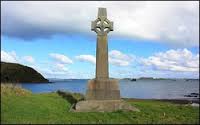
The Abrahamist tradition of Christianity has come to New Zealand in several waves, each one contributing to the replacement of traditional Maori spiritual practice, most of which has now been forgotten. But just who are the numerous followers of this Middle Eastern cult in New Zealand?
The statistic that will surprise many people is that there is no significant correlation between being of European descent and being Christian in New Zealand – this was -0.07. There are several reasons for this.
The most obvious is that, when people in New Zealand think ‘Christian’, they usually, without realising it, think ‘Anglican’ or, especially on the South Island, ‘Presbytarian’. The correlation between being Anglican and being of European descent is a strong 0.60, and that between being Presbytarian and being of European descent is 0.40.
Christians are much more likely to be Pacific Islanders than they are either Maoris or Asians. The correlation between being a Christian and being a Pacific Islander is 0.46, compared to -0.37 for being Maori and 0.03 for being Asian. Predictably, given all of these statistics, there is a significant negative correlation between being born in New Zealand and being Christian (-0.24).
Old New Zealand and New New Zealand divide sharply in attitudes towards Catholicism. There is a correlation of -0.27 between being of European descent and being a Catholic, and a correlation of -0.28 with being Maori and being Catholic. This contrasts with the correlation of 0.40 between being a Pacific Islander and being Catholic and the correlation of 0.42 with being Asian and being Catholic.
The obvious explanation for this is the strong negative correlation between being Catholic and having been born in New Zealand, which was -0.41.
Attitudes towards Mormonism, on the other hand, divide European New Zealanders from the others. Kiwis of European descent are highly unlikely to be Mormons: the correlation between the two is -0.71. Asians are mostly indifferent, with a correlation of 0.07, but Mormons are very likely to be Maori (the correlation between the two is 0.54) and even more likely to be Pacific Islanders (the correlation there is 0.68).
The reason for this is Mormons are generally quite hard done by. The correlation between being Mormon and median personal income is -0.46. Likewise, being a Mormon is negatively correlated with having any of the four university degrees. This reflects a deliberate strategy on the part of the Mormon church to target vulnerable people with their propaganda, knowing that the more desperate someone is the more likely they are to fall prey to a religion.
It could be predicted from the above that Anglicans and Presbytarians are signficantly more likely to be old. And they are – the correlation between median age and being Anglican is 0.56, and between median age and being Presbytarian it is 0.43.
Being Christian had a significant negative correlation with having a university degree, and looking closer at this shows a few distinctions. Being Catholic was positively correlated with having a Bachelor’s degree (0.37), with having an Honours degree (0.31) and with having a Master’s degree (0.37), which went against the general trend.
It was the mystery category of ‘Christian not further defined’ that caused the overall correlations between being Christian and having a university degree to be negative. Being ‘Christian not further defined’ had a correlation of -0.24 with having a Bachelor’s degree, -0.37 with having an Honours degree, -0.26 with having a Master’s degree and -0.39 with having a doctorate.
For both Maoris and Pacific Islanders, the correlation between being in this category was greater than it was for people of European descent or Asians. So this category may contain the various Christians that have not been raised in a particular subreligion (such as Anglicanism), i.e. adult converts, who as a rule have it worse than adults who follow the religion they were raised into.
Working in no industry had a positive correlation with being Christian, but many had negative correlations. The strongest was between being Christian and working in the arts and recreation services. This was a very strong -0.63. Perhaps the reason for this is that people who work in arts are iconoclastic by their very nature, as most creative people are, and therefore reject religious tradition.
There was also a strong negative correlation between being Christian and working in administrative and support services (-0.52), accommodation (-0.49), education and training (-0.48) and information media and telecommunications (-0.40). The most likely explanation for at least some of these is that Christians tend to be much older than the average worker in these industries.
There is also a significant negative correlation between being a Christian and being a professional (-0.42), reflecting the generally poor academic achievements of Christians.
Perhaps reflecting a general middle-of-the-road conservatism, being Christian had a negative correlation with being in all of the income bands below $15K and all of the bands above $50K. This was not the case for Catholics, who had a correlation of 0.30 with being in the $100-150K income band and a correlation of 0.24 with being in the $150K+ band.
Reflecting a combination of age, seniority and political dominance, there was a significant correlation between being Anglican and being a manager – this was 0.44.
The point about political dominance and disenfranchisement is underlined by the significant positive correlations between turnout rate in 2014 and being Anglican (0.41) and between turnout rate in 2014 and being Presbytarian (0.32). Contrast this with the very strong -0.68 between turnout rate in 2014 and being Mormon.
Presbytarians are very strong on the South Island, refecting the strong Scottish influence there. The correlation between being a Presbytarian and being a South Islander is 0.56.
*
This article is an excerpt from Understanding New Zealand, by Dan McGlashan, published by VJM Publishing in the winter of 2017.
